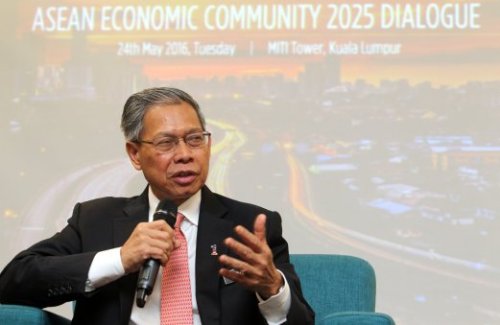
New Straits Times | 24 May 2016
Two chapters in RCEP agreement to conclude in June: Mustapa
By Rupa Damodaran
KUALA LUMPUR: Two chapters of the Regional Comprehensive Economic Cooperation (RCEP) agreement text will likely be concluded in the next round of negotiations in Auckland in June said International Trade and Industry Minister Datuk Seri Mustapa Mohamed.
Economic and technical cooperation chapters will be the first two chapters to be concluded during the 13th round of negotiations, ahead of plans to seal the deal by year-end.
"Negotiations on consolidated text are being expedited,"he told an Asean Economic Community (AEC) 2025 dialogue session.
RCEP regional trade agreement involves 10 Asean members plus China, Japan, Korea, India, Australia and New Zealand, which together contribute 30 per cent of global GDP.
The negotiators missed their target of concluding the talks by end-2015 which Mustapa said was due to the various ambition levels of the diverse group.
So far 12 rounds of negotiations have been held which touched on modalities for goods, approaches towards scheduling services sector offers and investment reservation list.
Unlike the more ambitious Trans Pacific Partnership agreement which was signed in February, the RCEP does not have any consensus to include government procurement, labour and environment. Instead it has competition, intellectual property and e-commerce as new areas in the trade pact.
Meanwhile Mustapa said Malaysia will take the lead in ensuring a harmonisation of standards under the Asean Economic Community (AEC 2015) which took shape early this year.
The Asean Economic Community Blueprint 2025 which will focus on a well-integrated and connected market within the global economic system wants to be a region with a key role in global value chains.
Under the AEC 2015, 96 per cent of goods traded are duty free – with the Asean-6 (Brunei, Indonesia, Malaysia, the Philippines, Singapore, and Thailand) having 99.20 per cent of tariff lines eliminated one the one side and CLMV (Cambodia, Laos, Myanmar and Vietnam) countries having 90.85 per cent of tariff lines eliminated.
Services, added Mustapa, remain a challenge and remains work in progress under the Asean framework agreement on services (AFAS).
The 9 AFAS provides liberalisation of 101 subsectors with foreign equity up to 70 per cent, nine packages for air transport and also 8 MRAs of which only engineering and architectural have been recognised so far.
The Asean Comprehensive Agreement has led intra-Asean investment to swell to US$24.4 billion in 2014, the second largest investor in its own region.
Mustapa also cited A.T. Kearney & JWT results on a survey on Asean CEOs’ perception of the AEC and while 83 per cent of those surveyed were positive, more than 40 per cent indicated that it would have the highest impact on supplier networks, distribution channels and outbound logistics.
The private sector’s main grouses about the common market are related to customs and transit issues, non- tariff barriers, healthcare and life sciences, financial services liberalisation, insurance and tax issues.
The other areas are IPR (intellectual property rights), and illicit trade, digital innovation, automotive and private sector dialogue and consultation.
Asean Business Club president Tan Sri Munir Majid urged the private sector to play a more active `bottoms-up’ role in helping to realise the success of the single market by identifying problems which can resolved bilaterally.
There are at least 19 business councils in the region and 66 organisations with an Asean agenda.
He also lamented that there was a lack of coordination between the various ministries within Malaysia.